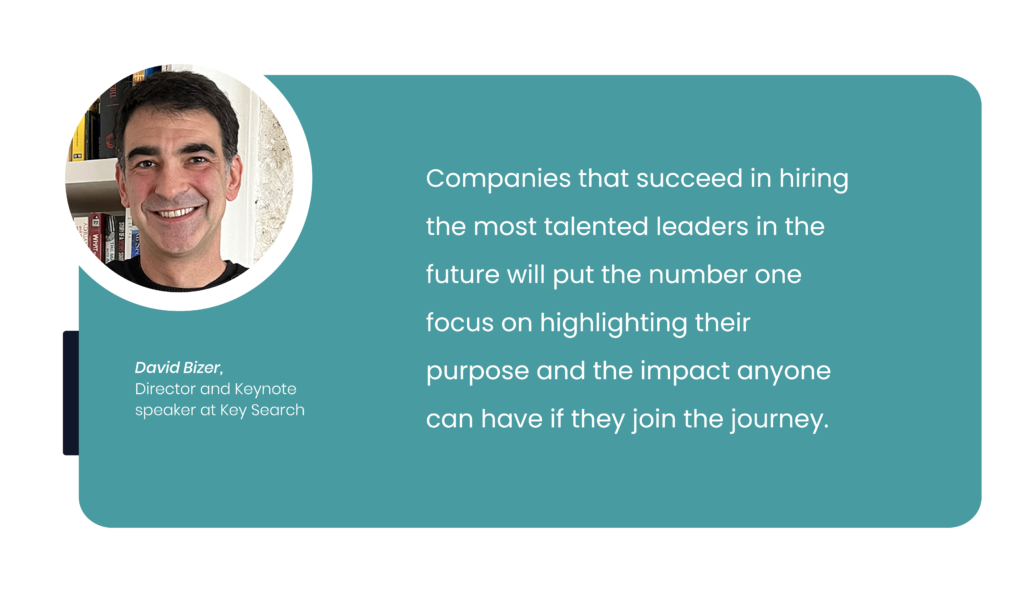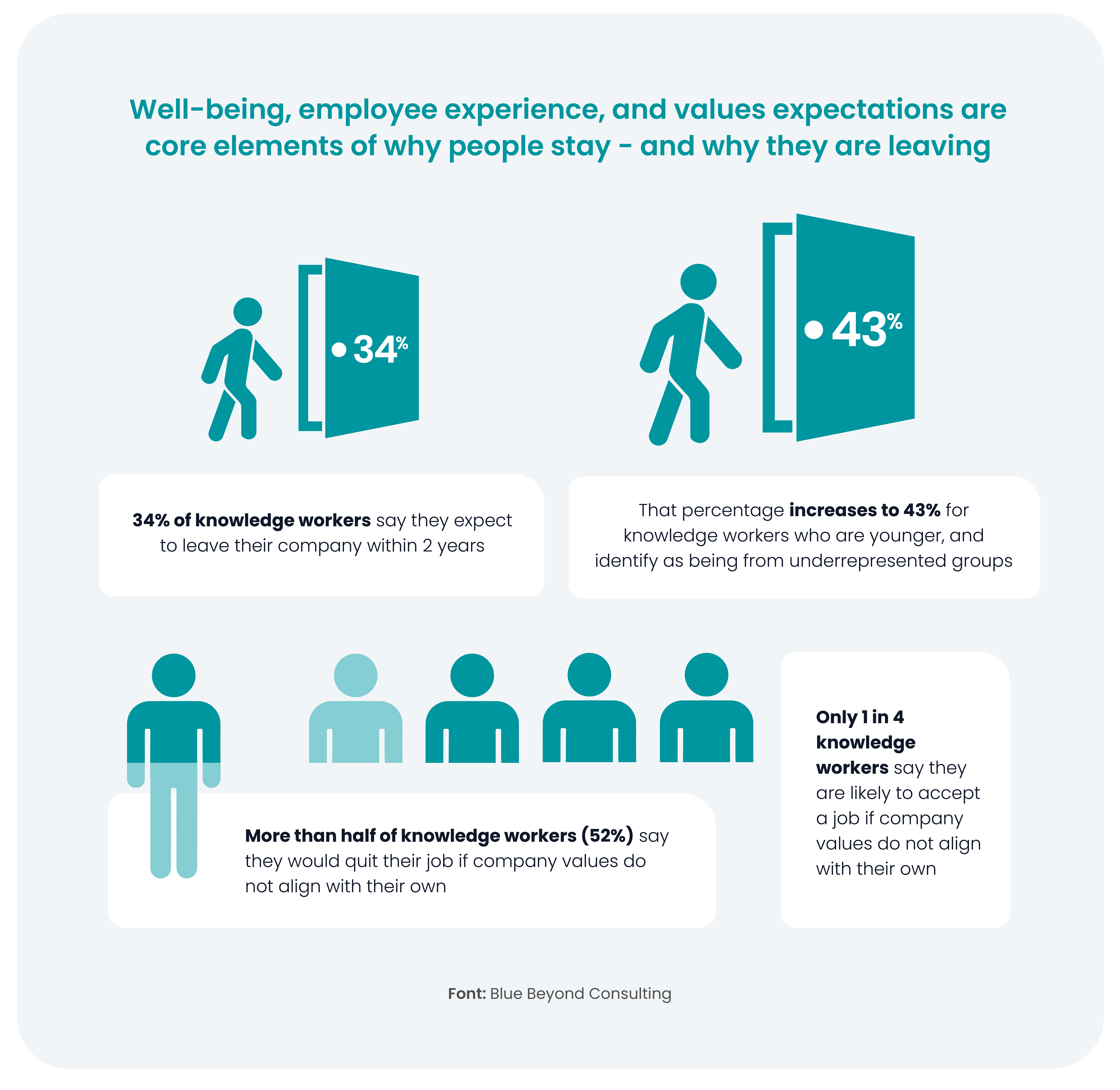From company to candidates - why purpose is a priority
Times have changed – after two years in a pandemic, an ongoing war, economic and climate crises, a job is no longer a job. Everyone has been talking about the “Great Resignation” and why people have quit jobs in droves.
While many factors have played into the individual decision of each employee who left their job, the bottom line is that they simply didn’t find purpose or meaning in their role and went looking for it elsewhere.
So, what do employees want from their employers today and how can HR leaders and leadership recruiters hire for purpose? In this article, we will take a closer look at purpose as one of the key job motivators.
Contents
Why should businesses focus on purpose?
As executive recruiters working with hiring managers and founders across countries and industries, we see a substantial increase in candidates prioritizing the need for company and purpose-driven work.
Driven by socio-economic factors and the Great Resignation, employee expectations have shifted and with a global shortage of talent, organizations with a clearly defined company purpose meet the need of candidates, especially knowledge workers, for purpose-driven work.
Research by Blue Beyond Consulting and Harvard Business School confirms that business purpose is a key deciding factor for today’s candidates and, together with salary, one of the key job motivators once they have taken a role


Recruiting with Purpose
Attraction and retention used to be a numbers game.
2022 calls for a much more human approach.
Organizations should consider all the levers they have […] for building and strengthening relationships with individual talent.
For HR leaders, hiring managers, and founders, recruiting with authenticity and purpose is the only way to hire top talent. Communicating the purpose of a job, and the company, must translate into the entire recruiting process from the first interaction.
5 Steps of Recruiting with Purpose
1. Feature Purpose and Values in Role Descriptions
When you define the role, look beyond skills and experience. Clearly outline your company’s purpose, defined values and principles, together with the company culture that unites all employees as a core part of the communication around a role.
What can candidates expect from your organization? Speak to the intrinsic motivators, the company values and principles, to attract candidates to your company and their role within it.
2. Actively Seek out the Leaders You Need
Posting a job and waiting for the perfect candidate to apply is a thing of the past. In today’s recruitment world, HR leaders and founders must actively look for candidates who could be the perfect fit for a role and approach them with a purpose-centric message about the position and the company.
These leaders are not often actively looking for a new opportunity, so attracting future leaders and senior executives means communicating with purpose and transparency
3. Communicate with Purpose
Provide candidates with the company’s mission and purpose across written communication as well as in interviews. How will they be involved in making a difference?
Use the interview process to share the company’s purpose and values and ask questions to ensure that the candidate’s values align with that of the business. Explain the steps your company takes to create a balance between employee needs and company goals – an important building block of company culture.
4. Be Transparent Around Company Purpose
Be a force for good and back up your company claims. Create trust as candidates research and ask questions by making company purpose a key differentiator.
Provide examples of how your organization’s purpose is part of the everyday tasks and the long-term strategy that leads to a positive impact on the individual and society.
5. Onboard with Purpose
Understand employee expectations and cultivate them from day one, and even before the official start date. Continue the conversation, and highlight the impact the employee will have as an individual, as part of a team and as part of an organization that is a “force for good”.
Connect your business purpose and goals to employee values and goals. Share other employee’s stories and testimonials. Build trust through transparency and create a sense of belonging for new talent. Why do people work here, and why do they believe in what they do? Over time, this turns employees into brand ambassadors and has been proven to increase company performance, productivity and retention.
Candidates looking for Purpose
Specifically knowledge workers expect that the organizations that employ them are a force for good for them, the workforce and the world.
What is the impact a leader has if they join your company’s journey?
This is particularly important to workers ages 45 and younger, according to research conducted by management consulting firm Blue Beyond Consulting and human-resources research firm Future Workplace. In fact, more than half (52%) of knowledge workers said they would quit their jobs if their employers’ values did not align with their own.

Finally, the report found that over 70% of every age group, region, company size and nearly every demographic group expect their employer to be a force for good
HR Leaders and founders: what is your company’s force for good for the individual, the company and the world?
Given these results, founders, leaders and HR managers need to zero in on defining their company’s “force for good” to be able to attract, hire and retain the best leaders for their organization. From initial communication with top talent in the recruitment process to the onboarding and everyday communication in the company, it’s the company purpose that makes employees and employers thrive.
Want to know more?
For further reading on the importance of purpose, principle fit, company culture, and more related topics?
Key Search Hires Your Leaders
At Key Search, we help clients attract and hire leadership candidates who are a perfect match to their company purpose, values, principles and culture.
We understand the importance of hiring for aligned purpose and values. With your company’s purpose clearly communicated from the start, we actively seek out top leadership talent with aligned values and where your company purpose resonates.
To see how Key Search can help your organization hire their leaders, let’s have a first chat to see how we can support you.
